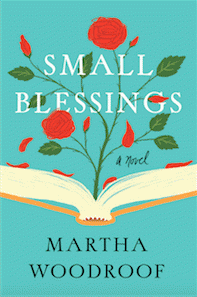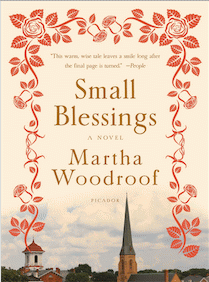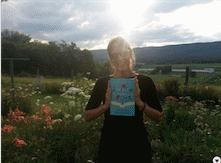| Back OpEd News | |||||||
|
Original Content at https://www.opednews.com/articles/Martha-Woodroof-Knocks-Sm-by-Joan-Brunwasser-Alcoholic_College_Fiction_Interviews-150508-263.html (Note: You can view every article as one long page if you sign up as an Advocate Member, or higher). |
|||||||
May 8, 2015
Martha Woodroof Knocks "Small Blessings" Out of the Ballpark
By Joan Brunwasser
At NPR, I worked with a couple of wondrous editors who taught me how to do the hard, disciplined thinking that goes into meaningful storytelling and the power of simple, precise language. Small Blessings got published because I made a bucket list in my early sixties. As I'd already had a lot of fun and done a lot of different stuff, that bucket list was one item long: Publish a novel!
::::::::
Chatting with NPR Correspondent and First-Time Novelist, Martha Woodroof
My guest today is Martha Woodroof, NPR freelancer and author of Small Blessings.
JB: Welcome to OpEdNews, Martha. While this is your first novel, you're certainly no ingenue. According to your website, you've had a rather scattershot career trajectory. What compelled you to write a novel at this point in your life?
MW: You're right! I have my spent my life racketing around, both personally and professionally. I do think, however, that my adventures have had two abiding through-lines: a love of stories and a love of words.
Small Blessings may be the first novel I've published, but it is actually the third I've written -- meaning I'm one of those authors who taught herself to write book-length fiction by writing book-length fiction.
I think I only got good enough to publish by doing years of long-format freelance reporting for NPR on the subject of books and publishing.
At NPR, I worked with a couple of wondrous editors who taught me how to do the hard, disciplined thinking that goes into meaningful storytelling -- how to figure out exactly what the story is that you want to tell and then how to drive the narrative forward to the conclusion of that particular story. They also taught me the power of simple, precise language. If my writing is clear and vivid, the listener/reader will become engrossed in the story I'm telling rather than being distracted by the words I'm using to tell it.
Small Blessings got published because I made a bucket list in my early sixties. As I'd already had a lot of fun and done a lot of different stuff, that bucket list was one item long: Publish a novel!
I am nothing if not tenacious! And I'm also really, really lucky in that I got taken on by the redoubtable Kate Garrick of DeFiore & Co.
JB: Great opener, Martha, so many different ways we can go! Where to begin? Let's see. I agree that you lucked out with those editors at NPR who taught you so much about the craft of storytelling. At heart, Small Blessings is a story about love - not simply a love story, although it's that too, but a story about the different kinds of love. It's also pretty optimistic. Were you ever concerned that this, your first published novel, might come off as a bit sappy in an increasingly cynical society?
MW: In a word, no. I've always found cynicism to be an extremely limiting and pretty joyless stance, and cynics to be boringly predictable in their I-sneer-therefore-I-am take on almost everything.
In my experience, life is full of people handing out random acts of loveliness. Take, for example, the bus driver in Tempe, Arizona, where I went to do a story on baseball spring training. I hopped on, lugging my recorder, my microphone, and my usual giant purse. The driver took one look at me and said. "You're not from around here, are you?" I said, "No sir, I'm not." He pulled the lever to close the door, grinned up at me and said, "Well, young lady, you ride wherever you're going today for free!"
Sure, I've had real troubles and trainwrecks in my life, but they've mostly been self-inflicted. I'd rather learn from those troubles and trainwrecks than retreat behind the great wall of cynicism. Sappiness in novels to me is happy outcomes that are unsupported by character growth. What I want to write about is people who have the capacity to live fuller, happier lives and somehow find the guts to do it!
JB: And you did! You once managed a college bookstore coffee shop. Did you ever imagine that experience would resurface as the backdrop for a main character in your novel years later?
MW: Well, maybe. I'd wanted to write a publishable novel for years before I got there. The Sweet Briar College Book Shop was such a lovely bubble of a town-gown world that I remember working there as feeling kind of like working in the middle of a non-fiction novel -- if that makes any sense.
I do think one advantage of being a late-life novelist is that you've lived long enough to have a wide range of experience among different people living and different places. I was so happy working at the Book Shop, and since I do like being happy, let's leave it that I'm not surprised I used my bookstore as Rose's bookstore.
JB: Small world! My mom went to Sweet Briar for a year before coming back to Chicago and marrying my dad. In your book, an African-American boy comes out of left field and turns life upside down. In the process, he is pretty quickly accepted by both those directly concerned and the community at large. Has the South changed enough for something like that to actually happen? Have we achieved a post-racial society or is Small Blessings the setting for an exceptionally "enlightened" cast of characters?
MW: I had to really think about this because of recent events.
I grew up in Greensboro, North Carolina, and cut my activist teeth in Civil Rights, taking part in the first Woolworth sit-in as a thirteen-year-old, and doing volunteer work with a group that tutored African American students making up for their years of "separate but equal" education. At one of our group's planning meetings, the Klan burned a cross in a neighboring field.
The last six years have made me realize that those of us in the South who are color blind were naive in thinking that electing Barack Obama meant American society had gone post-racist. Obviously American society has not. Struggles over money and power and pecking order (class) still masquerade as struggles about skin color or ethnicity.
But the South I grew up in, where race mandated social behavior, has thankfully gone; not only from the law, but also -- and I do believe this -- from most people's hearts. So I think the answer to your question about whether America has gone post-racist is both no and yes.
As far as Henry goes, I think there's nothing about his acceptance by the college community that is contrived or unrealistic. It would have happened anywhere I've lived, and I've lived quite a few places.
JB: Too much drinking and how it can mess up a person's life also play a part in Small Blessings. You've written in your blog that was once an issue for you. Was it tricky to weave that aspect into the mix, especially since alcoholism involves at least some denial leavened with a willful lack of awareness?
MW: Wow, that's an easy one. Not at all, as a lot of the truly useful stuff I learned about myself and about living a happy and productive life, I learned through the process of getting -- and staying -- sober.
Addiction is a disease; not all that well-understood a disease, perhaps, but still an illness that requires long-term treatment. I think the denial you talk about in alcoholics is exacerbated by our fear that once we say we're alcoholics and ask for help in building our habits of being around something other than our drugs of choice, we'll somehow be regarded as lesser human beings. I'm quite fiercely open about being a recovering drunk and pill-popper in the hope that someone whose addiction is still active will see that I, for one, am having much more fun sober than drunk. And that other people don't appear to think any less of me for having a treatable illness.
About denial -- In my opinion, it's a problem that is not confined to active alcoholics and addicts. I'm drawn to write about the struggles I think most of us have in truly being ourselves. As far as I can tell, the first step toward deeply enjoying life is accepting (as opposed to denying) who we really are -- instead of who we wish we were or who we think we should be. Given this, it was kind of a no-brainer for me to mix a couple of alcoholics into Small Blessings' character soup.
JB: I'm glad you're "fiercely open" about your sobriety. It can only help open up the larger conversation we all need to have regarding addiction, illness, ourselves and our community. On your blog, you mention that you are/were both a college and grad school dropout. I didn't even know it's possible to be both. How did you pull that off? It certainly didn't affect your ability to depict a college campus.
MW: Ah yes! The old grad school magic trick...
I was living in Charlottesville, working in television, when I got the bright idea to do a one-hour special on the UVA basketball team. This was during the Ralph Sampson era, when the 'Hoos were pretty regularly ranked #1 in the country. I have my father to thank for my interest in sports. He lived his whole life surrounded by women (five sisters, no brothers, only daughters). I was the younger of those daughters and also a tomboy, so Pops taught me both how to play and how to watch a lots of different sports. Thanks to him, I got to do stats for the L.O. (local origination) broadcasts of the UVA games, which meant I somewhat got to know the players and the coaches.
I focussed my TV special on the players as people rather than as athletes. Coach Holland (Terry Holland, head men's b'ball coach at the time) loved it, and I think it got a fair bit of buzz around UVA.
At the same time I was doing a lot of theater, including shows with the UVA theater department. When I got the idea of going to theater grad school, the faculty was all for it, but there were still two non-negotiable hoops to jump through: 1)I had to pass the GREs; and 2) I had to get the dean's approval.
The GREs were not a problem. So that done, I went to see the dean. He and I sat in his office talking about this and that. Every so often he'd asked me what I'd published, as there'd been seven other folks admitted to UVA grad schools before who were all published authors. Every time he asked, I'd say the same thing: nothing. Then, as I remember it, he kind of started, sat up and said, "You're the woman who did that TV special on the basketball team, aren't you?"
I said, "Yes sir, I sure am."
We chatted a bit longer, I left, and my acceptance letter to grad school arrive about ten days later.
As to college campuses, I've been around them my whole life. My mother taught at the University of North Carolina at Greensboro, my first husband was at Rice, my first Charlottesville restaurant was across the street from Mr. Jefferson's Rotunda, and I worked at Sweet Briar.
JB: Are there college brats like there are army brats, Martha? If so, you definitely qualify! The hardcover edition of Small Blessings came out a few months ago. What kind of response have you been getting? Were you in a tizzy about that, being a first-time novelist and all?
MW: I think, Joan, that I'm too mellow (old?) these days to be tizzyfied, which in no way should be taken to suggest I'm not terribly excited to have Small Blessings published.
The reaction I've gotten to Small Blessings has been overwhelmingly satisfying. People have written me interesting, appreciative letters -- everybody, it seems, loves Agnes. I've had a soupcon of goodreads savaging, but also some really interesting, thoughtful critiques that will help me to get better at this novel writing business. And that really is what it's all about for me. If I'm going to do something, I want to do it as well as I possibly can.
JB: I like your attitude - so grown up! [For the record, I admired Agnes but I really connected with Rose.] I understand that the paperback edition of Small Blessings is coming out very soon. What are we hoping for here? Will it get you more exposure, interviews, more space on bookstore shelves?
MW: Good golly, Joan, I hope so. Picador and St. Martin's have really gotten behind Small Blessings, so I'd love to see their efforts rewarded. Plus, think of all the people I haven't met yet who might invite me to speak to their book clubs.
JB: True. What haven't we talked about yet?
MW: I can't think of a thing. I'm so much more comfortable being the listener than the talker.
JB: I get that. I was interviewed in 2013 when I hit 1,000,000 page views and it felt peculiar to find myself on the hot seat. I'm dying to ask: What happened to the two novels that didn't get published? Do any remnants of them appear in Small Blessings? Was it wrenching to let them go after all that hard work?
MW: They are cozily interred in my home office file cabinet. Nothing from either one of them is in Small Blessings. They are clearly novice novels, but I really like one of them.
Wrenching to let them go? Go where? Who says I've given up on them? I'm with Yogi Berra in thinking that the game ain't over till its over...
JB: Sounds like you're keeping your options open. I have no problem with that. Now that you've published Small Blessings, do you have any plans to refill your bucket list?
MW: When I was a kid of thirty or so, I remember hearing Jimmy Buffett singing a song about how he'd rather die while he's living than live while he's dead. That's pretty much my mantra as I zoom through my late sixties.
That aside, I have no plans to refill my bucket list. Yet...
JB: I'll stay tuned. Good luck with the paperback launch. I loved Small Blessings; I was totally engaged and think our readers will agree. Thanks so much for talking with me. I enjoyed myself immensely!
MW: Well, hot dogs! And back at you as far as enjoyment goes! Thanks so much for asking questions that made me think!
JB: Music to my ears, Martha, music to my ears.
***
Martha Woodroof's website
Martha is producer of THE SPARK features on WMRA Public Radio
and author of Small Blessings (St. Martin's, 2014)
Martha's Author Page on Facebook
Follow Martha on Twitter @MarthaWoodroof
other NPR-inspired interviews:
Behind the Scenes of "This I Believe" with Dan Gediman 4.28.2013
Part two of Gediman interview 5.2.2013
Public Radio's "A Way with Words": Not Just for Word Nerds and Language Lovers 12.20.2014
Authors Website: http://www.opednews.com/author/author79.html
Authors Bio:
Joan Brunwasser is a co-founder of Citizens for Election Reform (CER) which since 2005 existed for the sole purpose of raising the public awareness of the critical need for election reform. Our goal: to restore fair, accurate, transparent, secure elections where votes are cast in private and counted in public. Because the problems with electronic (computerized) voting systems include a lack of transparency and the ability to accurately check and authenticate the vote cast, these systems can alter election results and therefore are simply antithetical to democratic principles and functioning.
Since the pivotal 2004 Presidential election, Joan has come to see the connection between a broken election system, a dysfunctional, corporate media and a total lack of campaign finance reform. This has led her to enlarge the parameters of her writing to include interviews with whistle-blowers and articulate others who give a view quite different from that presented by the mainstream media. She also turns the spotlight on activists and ordinary folks who are striving to make a difference, to clean up and improve their corner of the world. By focusing on these intrepid individuals, she gives hope and inspiration to those who might otherwise be turned off and alienated. She also interviews people in the arts in all their variations - authors, journalists, filmmakers, actors, playwrights, and artists. Why? The bottom line: without art and inspiration, we lose one of the best parts of ourselves. And we're all in this together. If Joan can keep even one of her fellow citizens going another day, she considers her job well done.
When Joan hit one million page views, OEN Managing Editor, Meryl Ann Butler interviewed her, turning interviewer briefly into interviewee. Read the interview here.
While the news is often quite depressing, Joan nevertheless strives to maintain her mantra: "Grab life now in an exuberant embrace!"
Joan has been Election Integrity Editor for OpEdNews since December, 2005. Her articles also appear at Huffington Post, RepublicMedia.TV and Scoop.co.nz.



